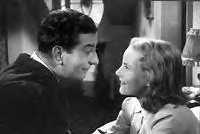London Town (film)
| London Town | |
|---|---|

Sid Field and Petula Clark
|
|
| Directed by | Wesley Ruggles |
| Produced by | Wesley Ruggles |
| Written by |
Val Guest Sig Herzig Elliot Paul |
| Starring |
Sid Field Petula Clark Greta Gynt Kay Kendall Sonnie Hale Tessie O'Shea |
| Music by | Jimmy Van Heusen (lyrics by Johnny Burke) |
| Cinematography | Erwin Hillier |
| Edited by | Sidney Stone |
| Distributed by | Eagle-Lion Distributors Limited |
|
Release date
|
30 September 1946 (UK release) |
|
Running time
|
126 min |
| Country | United Kingdom |
| Language | English |
| Budget | $2 million |
London Town is a 1946 Technicolor musical film, generally regarded as one of the biggest flops in the history of British cinema.
The screenplay by Sig Herzig, Val Guest, and Elliot Paul, based on a story by director Wesley Ruggles, revolves around comedian Jerry Sanford (Sid Field), who arrives in London believing he has been hired as the star of a major stage production, when in fact he's merely an understudy. Thanks to his daughter Peggy (Petula Clark, already a screen veteran at age fourteen), who sabotages the revue's star Charlie de Haven (Sonnie Hale), he finally gets his big break. The premise allows for a variety of musical numbers and comedy sketches performed by, among others, Kay Kendall in her film debut and Tessie O'Shea.
The critical and financial failure of the extravagant film, Britain's first major Technicolor musical, is part of British film legend. Financed by the Rank Organisation at a time of rationing and shortages of materials in the period immediately after World War II, it was filmed in the shell of "Sound City Shepperton," which had been made available as a film studio after being requisitioned during the war as a factory for aircraft parts. (The studio was later renamed Shepperton Studios and is still used for film production.)
Musical hall performer Field had cheered up wartime London audiences with his hugely successful stage variety shows, including Strike a New Note (1943), Strike it Again (1944), and Piccadilly Hayride (1946), so he seemed a natural for the lead. As he was of the opinion that no British director was capable of making a good musical, he insisted on having an American at the helm, and the task fell to Wesley Ruggles, who produced as well.
...
Wikipedia
